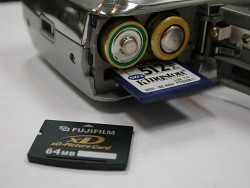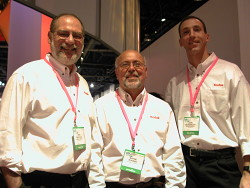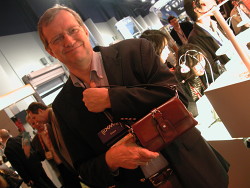DAY ONE: CONSUMER ELECTRONICS SHOW
CES: Make It Beautiful
 By MIKE PASINI
By MIKE PASINIEditor
The Imaging Resource Digital Photography Newsletter
LAS VEGAS, Nev. -- First make it work. Then make it beautiful. Digital imaging works and companies are making it beautiful. We visited several today, each of which had a different way to do it. But everything we saw was beautiful.
|
|
As we did with yesterday's report, we invite you to walk the floor with us by viewing our slide show (http://www.imaging-resource.com/EVENTS/CES07mrp/ces-monday/) of the products mentioned below. For the curious, the slide show created using the latest Adobe Lightroom beta on an 800-Mhz laptop. We imported the images, rated them as we captioned them with the IPTC caption field and made some white balance and exposure adjustments before exporting the Web gallery Lightroom automatically built from our selection. Talk about beautiful.
FUJIFILM | Back to Contents
In yesterday's report, we mentioned the new $299 F40 from Fujifilm (http://www.fujifilm.com), with an 8.3-megapixel sensor, ISO 2000 (with two stages of post-processing noise reduction), face detection technology and digital image stabilization. The attractive and compact unit is joined by the new A800 and A610 (several shots of which are in today's slide show). All three digicams share Fujifilm's new combo card slot that takes either an SD card or the smaller xD Picture card.

SD or xD Cards. Fujifilm's digicams support either formats in the same slot.
We also got a few more shots of Fujifilm's 6.3-Mp Z5, which is just one of several digicam models we saw that comes in colors other than black or silver. There is a silver model, but there's also what Fujifilm calls Mocha Brown and Raspberry Red. The colored faceplate slides to the side, revealing the small lens and the flash, too. And for just a moment (as you can see in yesterday's slide show), the Z5 logo lights up. Beautiful!
LEXAR | Back to Contents
We spent a few minutes with Lexar's Peter Carcione, who was excited about the company's new USB drives featuring PowerToGo software (http://www.lexar.com). The software, which Peter admitted the company was giving away with the inexpensive drives (and offering a free download to existing JumpDrive Mercury owners), clones your Windows computer's environment (including standard applications) as well as your documents to the USB drive. Just pop the USB drive onto another computer and access your email, your word processing documents, you browser bookmarks.

Mercury. The gauge shows how much space is free even when the thumb drive is unplugged.
The trick, Peter told us, was that PowerToGo preempts the host computer's registry, using the registry copied to the thumb drive. And it's Vista ready. There are some limits, he noted. Applications whose licensing schemes are based on hardware component identification won't work, for example. But having your computer on your keychain sounded like a beautiful idea to us.
The software is also available on the new swiveling Pro 360 comes in 1- and 2-GB capacities. The clever design pivots the USB plug out of it metal jacket, a protective housing. If you don't have a cap, you'll never lose it.
The company's Lightning models are their fastest. Housed in a shiny stainless steel shell with rubber bumpers, the drive offers read/write speeds-4GB capable of minimum sustained speeds of 200x (30MB/sec) read speed and write speed of 140x (21MB/sec). Peter said it actually uses one controller to write to two disks, interleaving the read and writes. And because it uses Single-Level Cell flash memory instead of the more common Multi-Level Cell, you get more read/write cycles (roughly 100,000 for SLC compared to 10,000 for MLC).
The Mercury mentioned above actually includes a free space gauge. The LCD gauge on the body of the drive shows available storage space even when the drive is unplugged. It also includes PowerToGo.
Very impressive lineup, we thought, walking to our next appointment. Small is, indeed, beautiful.
KODAK | Back to Contents
But we had to wonder when we saw Kodak's display of colored camera cases, beads and purses. The dockable V803 cameras, which have matching bags and purses (not to mention beaded wrist and shoulder straps), feature 8-Mp sensors with ISO as high as 1600 (see the news story http://www.imaging-resource.com/NEWS/1168287170.html for more details).

Pink Bliss. No, they don't sing. Unless provoked.
Kodak (http://www.kodak.com) has taken the color game a bit further than Fujifilm, offering the V803 in pink bliss, red shimmer, cosmic blue, mystic purple, golden dream, white glaze, silver essence, slate gray and java black -- and for just $199.95.
We noticed the unusually happy booth staff were all wearing pink bliss lanyards on their CES IDs.
The color is all about Kodak's initiative to let you personalize your camera. For the V803, you pick a color. But other models, otherwise condemned to silver, can have various skins applied to them, front and back.

Dave Accessorizes
So are the purses. Actually, they look like purses but they're more like camera bags, outfitted with various camera accessories. On the right person, we'd have to say they're beautiful. Although when Dave modeled with one, another word came to mind.
Kodak also introduced a line of photo frames. Again. Full details are available on our news story (http://www.imaging-resource.com/NEWS/1168279057.html) but the latest LCD frame foray by the company includes Kodak Color Science, Wi-Fi, stereo speakers and 128-MB of built-in memory. And, yes, you can personalize them. The standard black frame can be replaced by a number of other options, one of which is a whiteboard frame. It comes with a set of dry erase markers to decorate the frame. And we were assured the protective plastic cover on the LCD can be cleaned if a marker goes awry.
They also include a remote control to run slide shows and even rotate images (although the unit senses the correct orientation all by itself). They all plug into the wall (we suggested a solar powered unit, but we still couldn't get a pink bliss lanyard), so they're best as table-top units. Kodak did display a wall full of them, though. And, yes, they really did look beautiful.
SANDISK | Back to Contents
SanDisk (http://www.sandisk.com) introduced a little beauty of its own today. Among several other product introductions, the company showed off its elegant Cruzer Contour USB flash drive. The black and silver drive uses a sliding USB connector to eliminate the need for a cap.

Cruzer Contour. Compatible with Vista's ReadyBoost technology.
The Contour includes U3 technology for running applications directly from the drive and includes Skype and HP PhotoSmart Essentials photo editor, among others, just to prove it.
The drive is also compatible with Vista's ReadyBoost technology. Vista's new memory manager analyzes memory usage patterns, accelerating performance by retreiving data it anticipates will be requested next. The cache of prefetched data is kept in RAM for fast retrieval. But ReadyBoost takes advantage of the free space on USB flash drives to store the cache.
As we reported yesterday, SanDisk also introduced its 32-GB solid state drive. The 1.8-inch SSD is a drop-in replacement for standard mechanical hard disks, the company said. Adding an SSD to your notebook increases its cost about $600 but that's an attractive option to concerns that rely on flash-based drives like the military, aereospace and telecom industries. Power consumption during active operation is just 0.4 watt, compared to 1.0 watt for a hard drive. Beautiful!

TouchSmart PC. Yeah, but can it cook?
HP | Back to Contents
We spent a little more time at the HP booth (http://www.hp.com) looking at the company's TouchSmart PC. A Vista computer with a 19-inch touch screen protected by a glass window that can be cleaned with Windex, the system is designed to live in your kitchen. The HP-developed SmartCenter software includes recipes and a calendar with memo functions that look just like Post-it notes (with real handwriting). The system includes a card reader, WiFi, 360-GB hard drive, 20-watt speakers, NTSC and ATSC tuners (analog and digital HD) and optional printer for under $1,900.
No, we thought, beautiful as it is, we wouldn't want it in our kitchen. It's just too big. And the note function, well, that suffered a fatal flaw. It took a lot longer to come up on the screen than it takes to jot down a note and emphatically slap it on the refrigerator.
CONCLUSION | Back to Contents
But we like the idea of a large LCD that can display a DVD or video downloaded from the Web or images from any computer in the house. And that can play music from a computer, the Web or a CD. We like the idea so much, we wouldn't hide the thing in the kitchen, either.
But where's that ideal media center we're dreaming about? We'll hunt around for it at CES again tomorrow. Promise!

